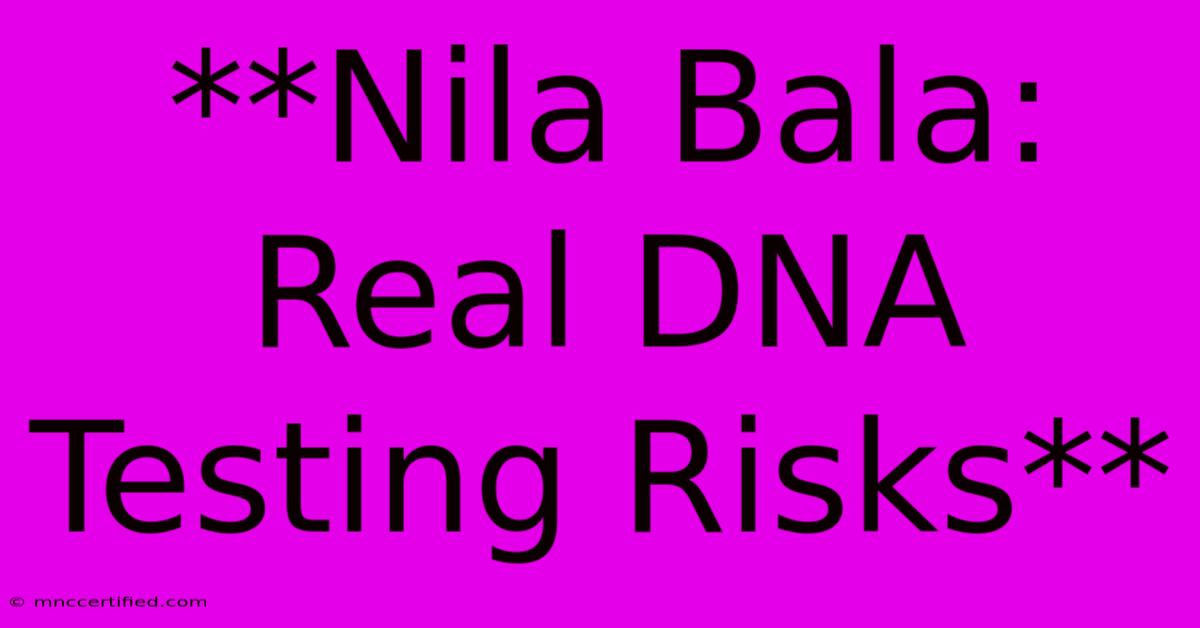**Nila Bala: Real DNA Testing Risks**

Table of Contents
Nila Bala: Unmasking the Risks of Real DNA Testing
The allure of ancestry tracing and personalized health insights has propelled DNA testing kits into the mainstream. But amidst the promises of uncovering family secrets and unlocking genetic potential, a growing concern is emerging: the ethical and practical risks associated with sharing your DNA. Nila Bala, a leading researcher in bioethics and genetics, sheds light on these often overlooked dangers.
The Shadow Side of Genetic Data Sharing
While many companies offer attractive features, including ancestry mapping, health risk assessments, and even personality insights, they often fall short in addressing the potential consequences of handing over your genetic code.
Here's where Nila Bala's research shines a stark light:
1. Privacy Concerns:
- Data Ownership: Who truly owns your genetic data? Many companies retain access to your DNA information, potentially sharing it with third parties for research or marketing purposes.
- Data Security Breaches: The risk of hackers accessing your sensitive genetic information is real. Even if companies claim robust security measures, a single breach can expose your most intimate details.
- Unintended Consequences: Sharing your DNA with companies might unknowingly reveal health conditions of your relatives, potentially impacting their insurance eligibility or employment prospects.
2. Ethical Dilemmas:
- Informed Consent: Do you fully understand the implications of providing your DNA sample? Many users may not be aware of the long-term consequences of their decisions.
- Genetic Discrimination: The potential for employers or insurers to discriminate based on genetic predispositions is a valid concern.
- Unforeseen Uses: The constantly evolving field of genetics means your DNA data could be used in ways you never envisioned, raising ethical concerns about informed consent and data control.
3. Societal Implications:
- Genetic Surveillance: As DNA databases grow, the potential for misuse by law enforcement agencies becomes more pronounced.
- Commercial Exploitation: Companies are increasingly using genetic data for targeted advertising and marketing strategies, raising questions about consumer privacy and ethical boundaries.
- Identity and Belonging: The complexities of ancestry tracing can lead to unexpected revelations and challenges to established identities.
Nila Bala's Advocacy for Responsible DNA Testing
Nila Bala advocates for a more cautious and informed approach to DNA testing. She emphasizes the need for:
- Transparency and Clarity: Companies must be upfront about their data handling practices, ensuring clear and accessible language for consumers.
- Enhanced Data Security: Robust security measures should be in place to protect sensitive genetic information from unauthorized access.
- Individual Control: Users should have greater control over their DNA data, including the right to delete or restrict its use.
- Ethical Guidelines: A framework of ethical guidelines should govern the collection, analysis, and use of genetic data.
Navigating the Genetic Landscape
Nila Bala's insights offer valuable guidance for navigating the ever-evolving world of DNA testing. While these tests can offer intriguing insights, it's crucial to approach them with a healthy dose of caution and awareness of the potential risks.
Here are some tips from Nila Bala's research to help you make informed decisions:
- Read the Fine Print: Thoroughly review the privacy policy and terms of service before submitting your DNA sample.
- Understand Data Ownership: Ensure you understand how your data will be used and whether you can access or delete it at any time.
- Consider the Potential Risks: Weigh the potential benefits against the risks associated with sharing your genetic information.
- Support Responsible Practices: Advocate for regulations and policies that promote data privacy and ethical use of genetic information.
By engaging with the ethical and practical implications of DNA testing, we can ensure that this powerful technology serves humanity in responsible and equitable ways. Nila Bala's research provides a valuable starting point for this crucial dialogue.

Thank you for visiting our website wich cover about **Nila Bala: Real DNA Testing Risks**. We hope the information provided has been useful to you. Feel free to contact us if you have any questions or need further assistance. See you next time and dont miss to bookmark.
Featured Posts
-
Concert Tickets This Week Scissor Sisters And More
Nov 08, 2024
-
Bengals Vs Ravens Recap Ravens Win 35 34
Nov 08, 2024
-
Workers Compensation Additional Insured
Nov 08, 2024
-
Occupied House Insurance During Probate
Nov 08, 2024
-
Houshmandzadeh On Bengals Challenges And Hope
Nov 08, 2024